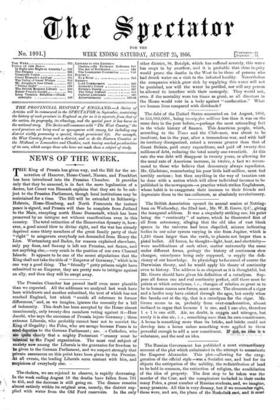The British Association opened its annual session at Notting- ham
on Wednesday, the 22nd inst., Mr. W. R. Grove, Q.C., giving the inaugural address. It was a singularly striking one, his point being the " continuity " of nature, which he illustrated first of all from astronomy, alleging that the old idea of vast blank spaces in the universe had been dispelled, science indicating bodies in our solar system varying in size from Jupiter, which is 1,240 times larger than the earth, to planets not larger than a pistol bullet. All forces, he thought—light, heat, and electricity— were modifications of each other, matter universally the same under different forms, geology the history of continuous slow changes, cataclysms being only supposed, ;() supply the defi- ciency of our knowledge. In physiology he favoured of course the Darwinian theory, and he would apply his theory of continuity even to history The address is as eloquent as it is thoughtful, but Mr. Grove should have given his definition of a cataclysm. Sup- pose all forces one and real continuity perfect, still there must be points at which cataclysms, i. e., changes of relation so great as to be to human reason new forces, must occur. The elements of a cigar and a lucifer may have existed through the ages, but surely when fire breaks out at the tip, that is a cataclysm for the cigar. Mr. Grove seems to us, probably from over-condensation, almost inclined to argue that because 1 is one, and 1 one also, therefore 1 1 is one still. Air, no doubt, is oxygen and nitrogen, but surely it is also air, i. e., something more than its own constituents. A house is something more than its bricks, and bricks could not develop into a house unless something were applied to them powerful enough to add a new constituent. It Oh sp fcles, is a. substance, and the soul an idea.






























